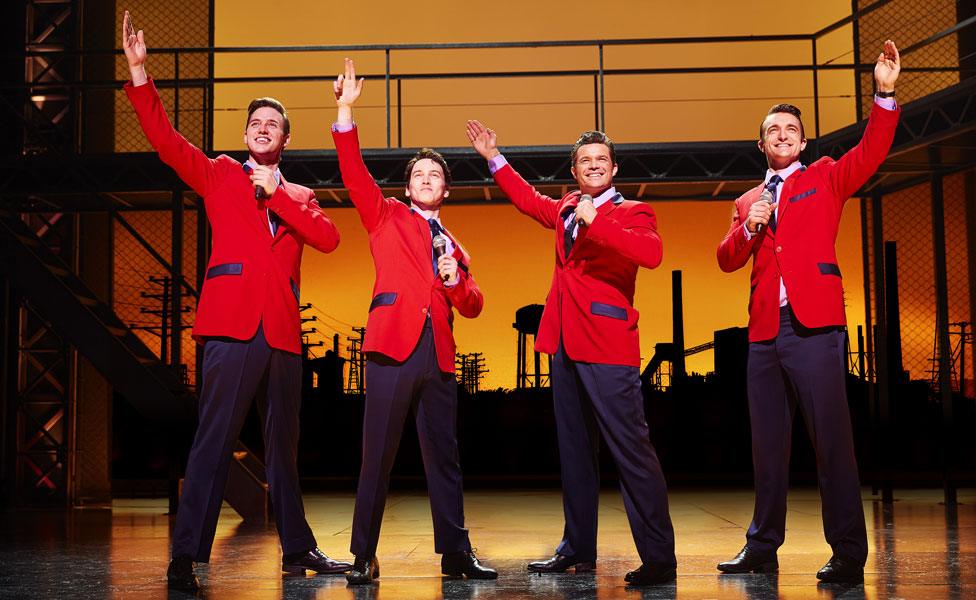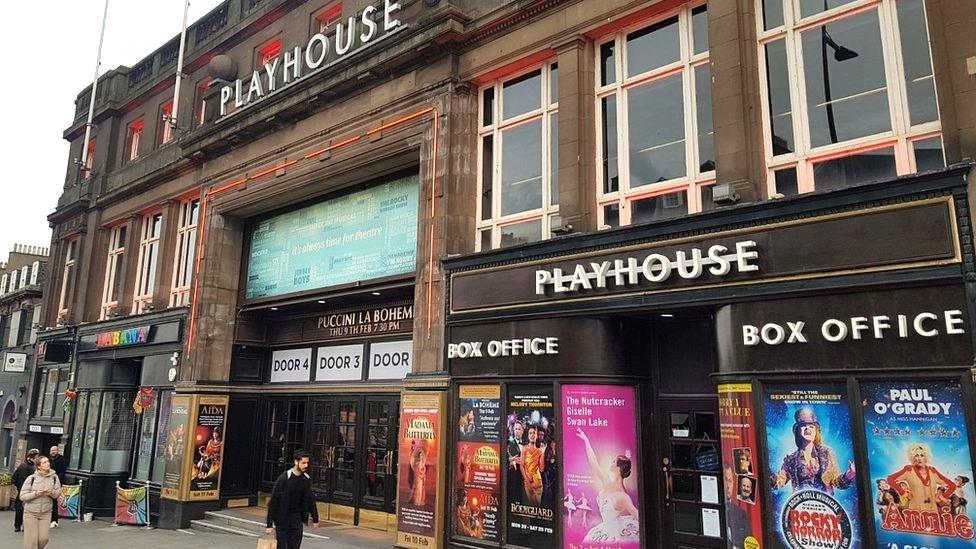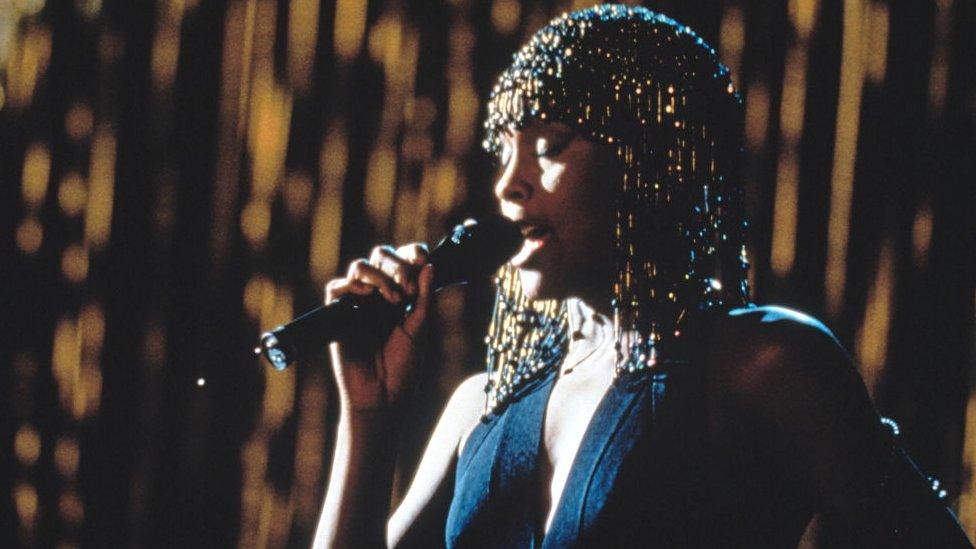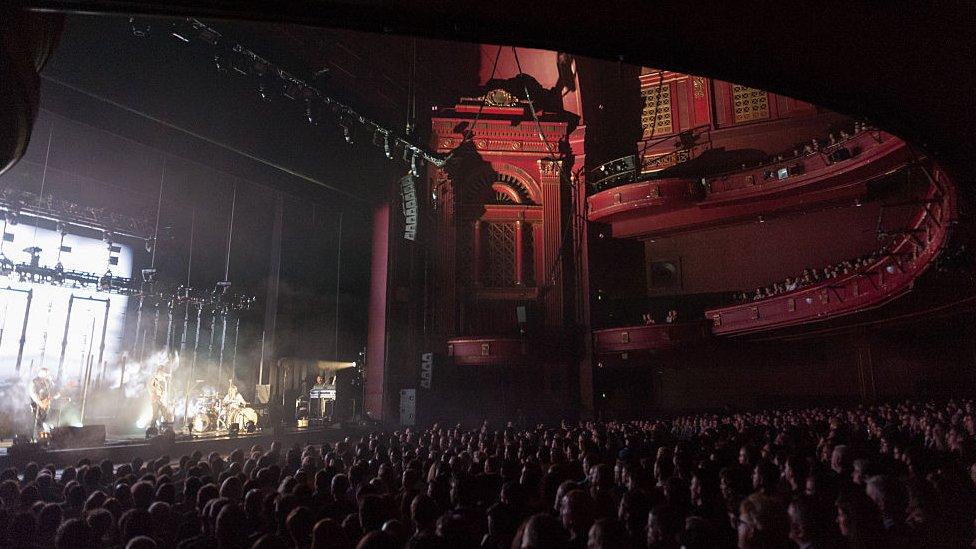Edinburgh Playhouse staff scared over rising abuse - director
- Published

Two people have been charged over a disturbance during a performance of Jersey Boys at the Edinburgh Playhouse
Staff at the Edinburgh Playhouse are "nervous and scared" due to a rise in verbal and physical abuse from patrons, according to its theatre director.
Colin Marr said the issue had become "significantly worse" since audiences returned after the Covid pandemic.
It comes after a 51-year-old man and a 54-year-old woman were charged over a disturbance during the musical Jersey Boys on 28 January.
Mr Marr alleges a staff member was punched during the performance.
Police Scotland said the two had been arrested and charged in connection with reports of a disturbance and a report would be submitted to the procurator fiscal.
Another incident this week saw a member of staff member "pushed and spat on", according to Mr Marr.
He said although such incidents only involve a minority in the 3,000-capacity venue, "on a particular Friday or Saturday night, you might have to ask three or four groups to leave because of their behaviour".
"Sometimes they react in a violent manner," he said. "From talking to other theatres throughout the UK, it is happening at a huge number up and down the country."
Mr Marr said some patrons have shown disregard for whether their behaviour disturbs performances - something he said staff had not seen before.
He said: "If someone is either singing really loudly or maybe standing up and spoiling the enjoyment of others, we might get a complaint or we see it ourselves and ask them to change their behaviour.
"Nine times out of 10, the person is embarrassed but on a small number of occasions, they become aggressive, start shouting and swearing at our staff and it ends in violence.
"The reaction is 'I have paid for my ticket, I don't care if other people can't see or hear'."

The Edinburgh Playhouse is the second largest theatre in the UK
Mr Marr added he was concerned about the impact on staff of dealing with aggressive audience members.
"It is not nice and you don't get used to it," he added. "It is a cumulative thing.
"If it's a one-off, you could brush it off but when you deal with two in a row, you can get down about it and then get a bit nervous and scared to come into work."
The King's Theatre in Glasgow issued a similar appeal on social media, external during the recent run of The Bodyguard featuring the songs of Whitney Houston, urging audiences not to sing along during shows.
It added that anti-social behaviour towards staff would not be tolerated.
The same production begins a week-long run at the Edinburgh Playhouse later this month, when extra staff will be brought in.

The Bodyguard is based on the 1992 film of the same name featuring the hits of the late Whitney Houston
"Most audience members are not even aware it is going on, they are having a wonderful time and have a great interaction with our staff," Mr Marr added.
"The vast majority want to hear the performer singing 'I Will Always Love You', not the person next to them.
"But that flashpoint can happen very quickly for a tiny majority."


Colin Marr said he took to social media to highlight the issues his theatre faces with rowdy audience behaviour.
But anyone who's been to any 'jukebox musical' in any part of the world will tell you it's not confined to the Edinburgh Playhouse.
Covid and cost of living play their part. During the pandemic, those who continued to go to the theatre, had to keep up with the rules, whether that was wearing masks, not wearing masks, eating, drinking, sitting, leaving.
Going for a night out became very complicated.
It's also become even more costly, putting patrons under pressure to have the time of their life, and unfortunately some people take that too far.
Those who haven't been to the theatre since the pandemic - or at all - will be more used to a home entertainment scenario when things can be paused, and no one complains if you want to flick through your phone to see what everyone else is doing.
You can have a glass or two at home without any ill effects, but in a darkened theatre on a night out, it can be a different story.
It's hard then to spell out the rules, particularly at shows like Jersey Boys or The Rocky Horror Picture Show, where audience participation is encouraged.
Some of these shows build instructions into the performance - dance moves included in Rocky Horror - but the rest is just common sense. Don't block the view of the person behind, who spent every bit as much as you on a ticket. Don't talk, eat, drink or move around and definitely don't bellow along, unless asked to join in.
Theatres are slipping down the same slope as cinemas, which without fierce ushers and ingrained etiquette, are now awash with people eating, drinking, talking and checking their phones. All of that is likely to deter cash-strapped audiences from supporting an industry which needs them more than ever.
But people power may prevail. Look at Broadway where actor Wendell Pierce stopped in the midst of Death of a Salesman, external to deal with a woman in the front row who demanded her money back. He insisted she should be refunded and waited till she left before resuming the play.
At least the audience didn't miss anything.

'Shared experience'
Arts critic and former cinema manager Ian Hoey told BBC Radio Scotland's Drivetime with John Beattie that audience behaviour was a "tricky" balance for venues.
"People want to go out to have a good time and you don't like to put restrictions on anyone," he said.
"But you have got to consider other people next to you have also spent a lot of money and are looking forward to a night out."

The Playhouse has a 3,000-seat capacity and hosts a variety of different musicals, theatre, opera and dance shows
Some shows, for example the Rocky Horror Picture Show, are designed to be "rowdy" and encourage audience interaction, he noted.
"In other ones, you can join in a bit but do you really have to shout and bawl and scream?" he added.
"It's a living, shared experience but the cast will sense the discomfort of an audience, if for example a group of people surrounding them are getting too excited.
"It's going to be overwhelming and you're not going to enjoy the show. So it's entirely reasonable for theatres to say 'look, just consider other people'."